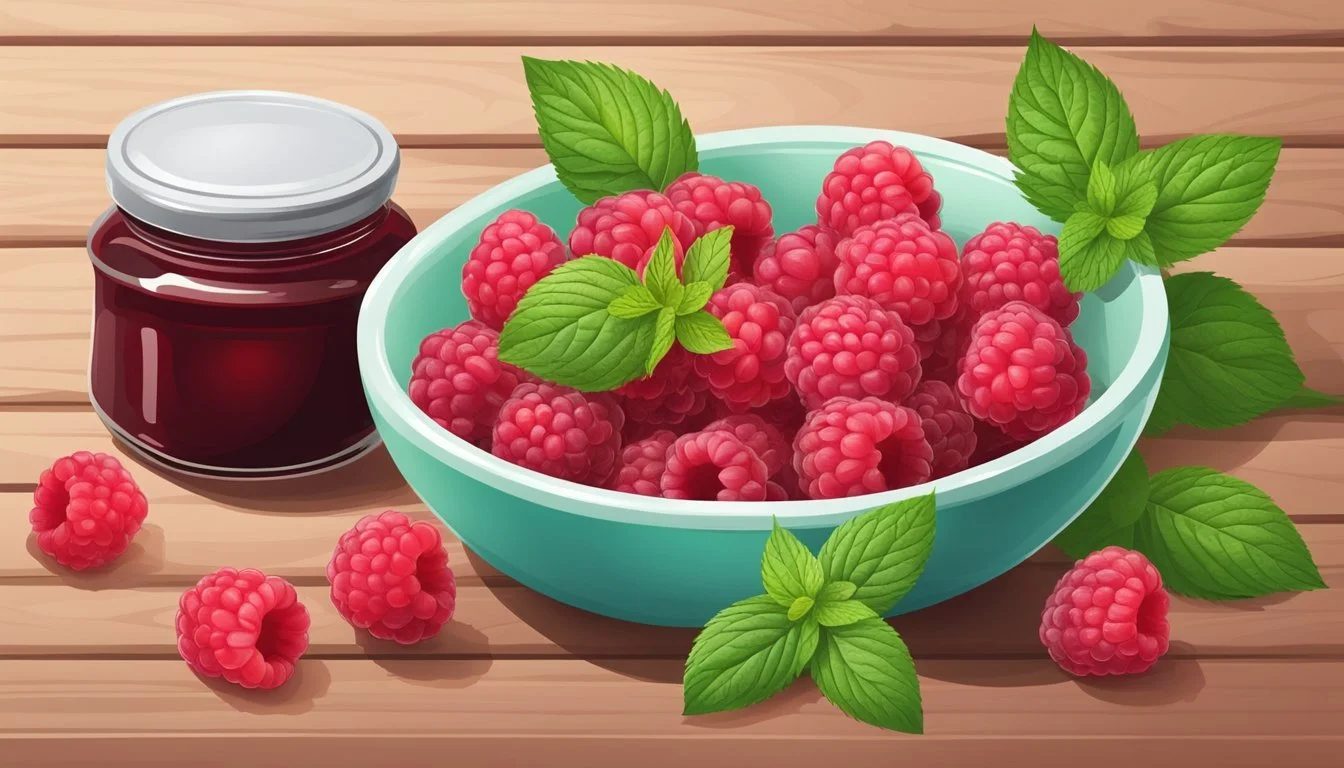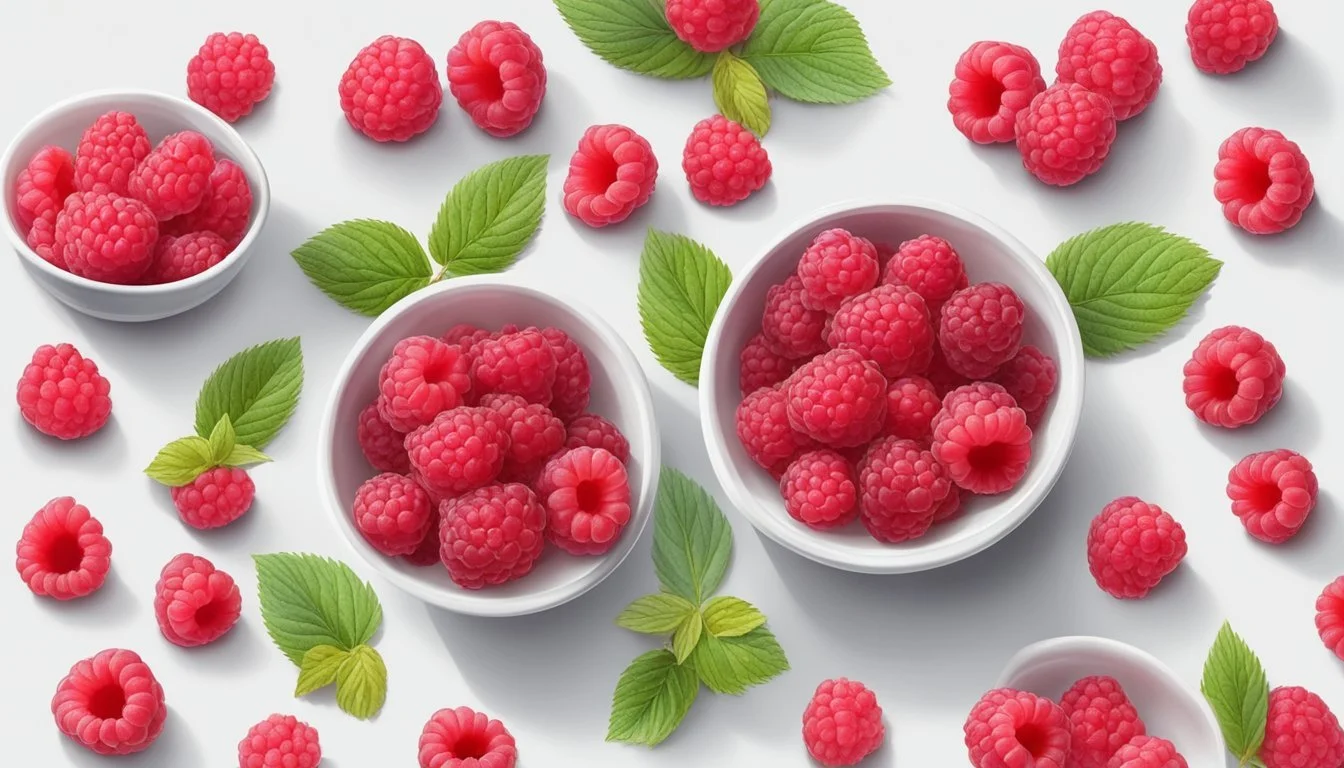Raspberries Substitutes
Best Alternatives for Recipes
Finding a substitute for raspberries can be crucial for those moments when this vibrant red berry isn't available. Whether for desserts, pastries, or jams, not having raspberries should not mean the end of your culinary plans. Red wine vinegar is an easily accessible and flavorful substitute for raspberry vinegar, retaining some of the unique taste nuances.
Raspberries are praised for their sweet, slightly tart flavor and their high nutritional value, including significant amounts of vitamin C, calcium, iron, and fiber. As raspberries belong to the rose family, other berries like blackberries and blueberries often serve as popular alternatives, providing a similar taste profile and texture.
Exploring various substitutes allows for culinary creativity without compromising on flavor. For those seeking sweet and tart combinations, consider options like cranberries or even kiwis. Having a range of substitutes ensures that the absence of raspberries won't hinder your cooking ambitions.
Understanding Raspberries
Raspberries are not only delicious but also packed with nutrients and health benefits. They are versatile in culinary uses, from fresh consumption to being key ingredients in various dishes.
Nutritional Profile
Raspberries are low in calories yet high in important nutrients. Per 100 grams, they provide:
Calories: 52
Fiber: 7 grams
Vitamin C: 26.2 mg
They also contain notable amounts of other vitamins and minerals, including vitamin K, magnesium, and folate. Polyphenols and ellagitannins contribute to their strong antioxidant properties, which are key for combating oxidative stress in the body.
Health Benefits
Raspberries offer several health benefits due to their high content of antioxidants, fiber, and vitamins. Antioxidants, such as quercetin and ellagic acid, help reduce the risk of chronic diseases by fighting inflammation.
Dietary fiber in raspberries aids in digestion and helps maintain heart health by lowering cholesterol levels. Vitamin C supports immune function and skin health. Additionally, the polyphenols in raspberries have been linked to a reduced risk of heart disease by improving blood vessel function and lowering blood pressure.
Culinary Uses
Raspberries can be used in a variety of culinary applications. They are often consumed fresh, added to cereals, yogurts, or salads. They can also be incorporated into desserts such as pies, cakes, and sorbets.
For savory dishes, raspberries can be used to create flavorful sauces for meats or dressings for salads. Raspberry jam and syrup are popular for their sweet and tangy flavor, often used over pancakes or in cocktails. Freezing raspberries allows for convenient use year-round without significant loss of nutrients.
Substitutes for Raspberries in Recipes
Finding the right substitute for raspberries depends on maintaining the desired flavor and texture of your recipe. The choice of substitute can vary depending on whether you need it for baking, making sauces or jams, or adding to desserts and pastries.
Selecting a Substitute Based on Flavor
For a tart yet sweet flavor profile similar to raspberries, red currants make an excellent alternative. They bring a comparable tanginess, fitting well in recipes for pies or sauces.
Blackberries are another great option, offering slightly deeper and more robust flavors. Their slight tartness makes them suitable for jams and desserts.
If you seek a refresher with added sweetness, strawberries can work well. They’re not as tart but can balance the flavor in mixed berry dishes.
Lastly, blueberries and cranberries can also serve as substitutes, particularly in baking and cooking, where their distinct flavors can bring a new twist to a recipe.
Selecting a Substitute Based on Texture
For a recipe that emphasizes texture, blackberries again can be a close match. Their similar seediness and softness make them ideal for pies and pastries.
Strawberries, while differing slightly in texture, can hold up well when cut into smaller pieces, making them suitable for desserts that require a fruit chunk.
Blueberries provide a smooth texture with fewer seeds, ideal for sauces and jams where a uniform consistency is desired.
A firmer texture can be achieved with cranberries, which can add a pleasant bite to baked goods and salads.
When selecting a raspberry substitute, always consider the role of the fruit in your recipe to ensure the best possible outcome.
Raspberry Varieties and Their Best Substitutes
Different raspberry varieties, whether European, American, or Black, offer unique flavors and textures. Substitutes can be found based on color, texture, and sweetness, making it easy to find an alternative when needed.
European Red Raspberries
European red raspberries are recognized for their sweet taste and bright red coloration. Popular varieties include Killarney and Polka. Killarney, originating from Canada, is known for its medium-sized, dark red fruit and cold tolerance. Polka, a Polish variety, produces large, firm berries.
Substitutes: For European red raspberries, strawberries can be a good replacement due to their similar sweet flavor and juicy texture. Red currants also work well, providing a tartness that complements most dishes.
American Red Raspberries
American red raspberries, such as the Heritage variety, are prevalent in home gardens across the United States. Heritage raspberries are known for their robustness and ability to bear fruit in the fall, yielding bright red, medium-sized berries.
Substitutes: Blackberries can be an effective substitute given their comparable size and sweet-tart balance. Boysenberries, another hybrid berry, hold up well in recipes that call for American red raspberries due to their similar texture and flavor profile.
Black Raspberries
Black raspberries, less common than their red counterparts, are notable for their deep purple-black color and antioxidant richness. A well-known variety is Bristol, which thrives in a variety of climates and offers sweet, medium-sized berries.
Substitutes: Mulberries can replace black raspberries in many recipes, offering a similar color and tangy sweetness. For those who prefer a more tart option, blackberries can be used, although they are slightly larger and may alter the texture of some dishes.
Each raspberry variety has unique qualities and optimal substitutes that can be easily incorporated based on their color and taste. This ensures that even if specific raspberry types are unavailable, suitable alternatives can maintain the quality of dishes.
Fruit Substitutes for Raspberries
Raspberries can be replaced with a variety of other fruits that mimic their texture, flavor, and nutrition. This includes several types of berries and other fruits that add similar qualities to both sweet and savory dishes.
Berries as Substitutes
Strawberries: Strawberries provide a sweet yet slightly tart flavor that can work well in place of raspberries. They have a similar juicy texture but are larger, so they may need to be chopped for recipes like pastries or salads.
Blueberries: Blueberries are a fantastic alternative due to their sweet flavor and small size. They are perfect for recipes where the fruit needs to blend smoothly, such as smoothies or jams. Unlike raspberries, they don't have seeds that get stuck in teeth.
Blackberries: Blackberries are a close match with their sweet taste and pleasant tartness. The larger size and slightly more robust texture make them excellent for baked goods and sauces. They can be used whole or pureed, similar to raspberries.
Cherries: Cherries, especially tart cherries, can substitute raspberries in recipes that require a more acidic and less sweet profile. They are versatile and work well in both cooked and raw dishes but should be pitted before use.
Cranberries: Cranberries are highly tart and a suitable choice if the recipe can handle more acidity. They're best suited for cooked applications like sauces or baked goods where the tartness can be balanced with sugar.
Other Fruits as Substitutes
Grapes: Grapes, particularly red or black varieties, can substitute raspberries in salads and desserts. They mimic the burst of juice with each bite. For recipes like salads, cutting them in half makes them easier to eat and distribute.
Apple: Although not berries, apples add a sweet and slightly tart flavor. They're ideal for baked dishes and can be used raw if sliced thinly. They provide crunch, which is different from the soft texture of raspberries.
Peach: Peaches, when ripe, have a syrupy sweetness and tender texture that mimics the juicy burst of raspberries. They are excellent in cobblers, jams, and desserts. Slices or chunks of peaches can replace raspberries effectively.
Mango: Mango offers a tropical sweetness and can stand in for raspberries in smoothies and fruit salads. The vibrant color and flavor can enhance the exotic profile of the dish. Dice the mango finely to match the size of raspberries.
Non-Fruit Substitutes
In situations where raspberries or their substitutes are inaccessible, non-fruit alternatives can still capture the essence and flavor. These alternatives can seamlessly fit into various recipes, adding a similar taste profile without relying on fresh or dried fruits.
Artificial Flavors and Extracts
Artificial flavors and extracts, such as strawberry extract, can mimic the sweetness and tangy notes of raspberries. Strawberry extract is a powerful alternative, providing a strong flavor without the need for fresh berries.
Strawberry powder is another versatile substitute. It can be easily added to baked goods, smoothies, and even sauces, delivering a concentrated burst of berry-like flavor. This powder dissolves well and imparts a similar color and taste.
Both these options are convenient, cost-effective, and have a long shelf life. They are particularly useful in baking and cooking, where precise measurements ensure consistent results.
Substitutes for Specific Raspberry Dishes
Raspberries can sometimes be challenging to find or may not be in season. Here, various substitutes offer similar flavor profiles and textures for raspberry-based dishes.
Substitutes for Raspberry Pie
Raspberry pies benefit from the fruit's balanced sweetness and tartness. Blackberries can be an excellent alternative, providing a similar flavor and rich color.
Alternatively, mix strawberries with a splash of lemon juice to mimic the tartness. Blueberries combined with a bit of cranberry juice can also replicate the desired taste and texture. Ensure that the sugar level is adjusted accordingly since different fruits vary in sweetness.
Substitutes for Raspberry Jam
When making raspberry jam, strawberries are a popular substitute. Their sweet flavor pairs well with many recipes, although they're less tart than raspberries.
To emulate raspberry's taste, adding a small amount of lemon juice can help. Another option is to use a mixture of red currants and blackberries, which will provide a similar tart-sweet balance. These substitutions ensure the jam maintains its desirable thickness and spreadability.
Substitutes for Raspberry in Desserts
For desserts like cakes and pastries, cranberries can replace raspberries. Cranberries offer a bright, tart flavor that complements many desserts.
When substituting, consider using sweetened cranberries or adding a bit of sugar to balance the tartness. Tart cherries are another good alternative, providing a similar depth of flavor. Mixing these substitutes with other berries like blueberries or strawberries can create complex, layered flavors reminiscent of raspberries.
Health Conscious Substitutions
When looking for raspberry substitutes, it's important to consider options that offer health benefits. Natural sweeteners and low-sugar alternatives can be both nutritious and practical.
Natural Sweeteners as Raspberry Substitutes
Natural sweeteners such as honey and maple syrup can be excellent alternatives to raspberries in recipes. Honey is rich in antioxidants and has antimicrobial properties. For baking, a good rule of thumb is to use 3/4 cup of honey for every cup of sugar and reduce the liquid by 1/4 cup.
Maple syrup is another natural option. Though it contains sugars, it has important minerals like zinc and manganese. Both honey and maple syrup can be used in smoothies, desserts, and sauces.
Low-Sugar and Sugar-Free Alternatives
For those focused on reducing sugar intake, stevia and monk fruit are effective substitutes. Stevia is a natural sweetener that is calorie-free and significantly sweeter than sugar, requiring less quantity to achieve desired sweetness.
Monk fruit extract is another option. It contains compounds that provide sweetness without raising blood sugar levels. Both of these alternatives are suitable for people with diabetes or anyone watching their sugar intake.
In addition, lemon juice can be used to add a fresh and tangy flavor, compensating for the sweetness lost in sugar-free recipes. It also brings a dose of vitamin C, enhancing the nutritional profile of the dish.
Practical Tips for Substituting Raspberries
When substituting raspberries, selecting the right alternative is crucial to maintain the dish's flavor and texture. Additionally, it's essential to consider storage and preparation techniques, along with proper quantity adjustments to ensure the best results.
Shopping for Substitutes
When visiting the grocery store, consider fruits that offer similar sweetness and texture to raspberries. Strawberries, blackberries, and blueberries are excellent choices. Frozen fruits can serve as suitable substitutes when fresh raspberries are unavailable.
Inspect the quality of fresh fruits to ensure they are firm and free from mold. For homemade applications, fruits like cranberries or pomegranate seeds can also be effective, though they might require additional sugar to match the natural sweetness of raspberries.
Storage and Prep Considerations
Proper storage of raspberry substitutes is vital to extend their shelf life. Refrigerate berries, keeping them in a breathable container to prevent moisture buildup. Frozen options should be stored in a sealed bag to prevent freezer burn.
When preparing substitutes, consider the prep time and total time for the recipe. Chopping or slicing fruits into smaller pieces allows for a more consistent texture. For baked goods, pre-cook certain substitutes slightly to release their juices, ensuring they blend well within the dish.
Adjusting Quantity and Measurements
Substituting fruits requires careful attention to quantities. Generally, a 1:1 ratio works well, but this can vary depending on the substitute. Some fruits may have a higher water content, affecting the consistency of your dish.
For recipes requiring a specific weight, such as a pound of raspberries, measure out an equal pound of the substitute fruit. If the substitute fruit is sweeter or more tart, adjusting the sweeteners or seasonings can help balance the flavors. In baking, consider the cook time and oven temperature as some substitutes might cook faster or slower than raspberries.








